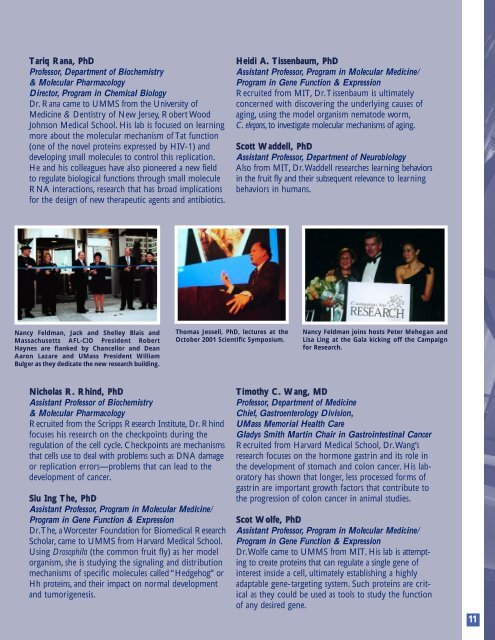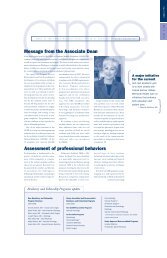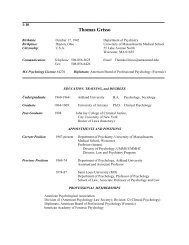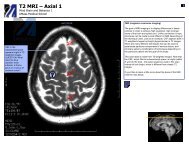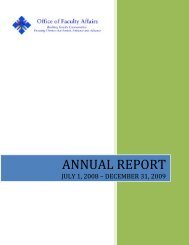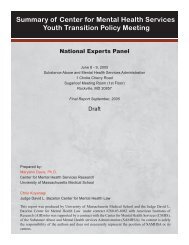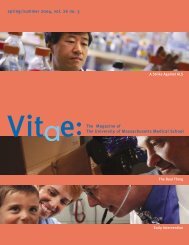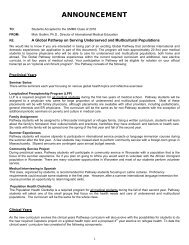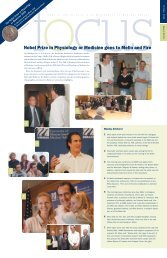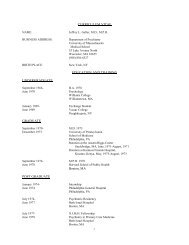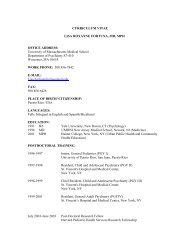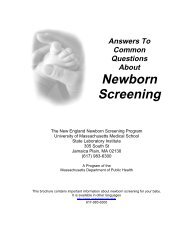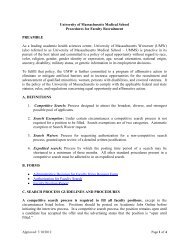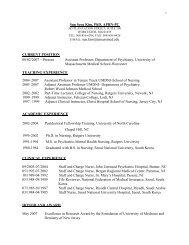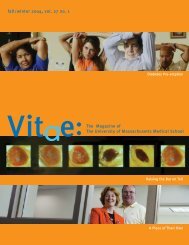Annual Report 2001 - the University of Massachusetts Medical School
Annual Report 2001 - the University of Massachusetts Medical School
Annual Report 2001 - the University of Massachusetts Medical School
Create successful ePaper yourself
Turn your PDF publications into a flip-book with our unique Google optimized e-Paper software.
Tariq Rana, PhD<br />
Pr<strong>of</strong>essor, Department <strong>of</strong> Biochemistry<br />
& Molecular Pharmacology<br />
Director, Program in Chemical Biology<br />
Dr. Rana came to UMMS from <strong>the</strong> <strong>University</strong> <strong>of</strong><br />
Medicine & Dentistry <strong>of</strong> New Jersey, Robert Wood<br />
Johnson <strong>Medical</strong> <strong>School</strong>. His lab is focused on learning<br />
more about <strong>the</strong> molecular mechanism <strong>of</strong> Tat function<br />
(one <strong>of</strong> <strong>the</strong> novel proteins expressed by HIV-1) and<br />
developing small molecules to control this replication.<br />
He and his colleagues have also pioneered a new field<br />
to regulate biological functions through small molecule<br />
RNA interactions, research that has broad implications<br />
for <strong>the</strong> design <strong>of</strong> new <strong>the</strong>rapeutic agents and antibiotics.<br />
Heidi A. Tissenbaum, PhD<br />
Assistant Pr<strong>of</strong>essor, Program in Molecular Medicine/<br />
Program in Gene Function & Expression<br />
Recruited from MIT, Dr.Tissenbaum is ultimately<br />
concerned with discovering <strong>the</strong> underlying causes <strong>of</strong><br />
aging, using <strong>the</strong> model organism nematode worm,<br />
C. elegans, to investigate molecular mechanisms <strong>of</strong> aging.<br />
Scott Waddell, PhD<br />
Assistant Pr<strong>of</strong>essor, Department <strong>of</strong> Neurobiology<br />
Also from MIT, Dr.Waddell researches learning behaviors<br />
in <strong>the</strong> fruit fly and <strong>the</strong>ir subsequent relevance to learning<br />
behaviors in humans.<br />
Nancy Feldman, Jack and Shelley Blais and<br />
<strong>Massachusetts</strong> AFL-CIO President Robert<br />
Haynes are flanked by Chancellor and Dean<br />
Aaron Lazare and UMass President William<br />
Bulger as <strong>the</strong>y dedicate <strong>the</strong> new research building.<br />
Thomas Jessell, PhD, lectures at <strong>the</strong><br />
October <strong>2001</strong> Scientific Symposium.<br />
Nancy Feldman joins hosts Peter Mehegan and<br />
Lisa Ling at <strong>the</strong> Gala kicking <strong>of</strong>f <strong>the</strong> Campaign<br />
for Research.<br />
Nicholas R. Rhind, PhD<br />
Assistant Pr<strong>of</strong>essor <strong>of</strong> Biochemistry<br />
& Molecular Pharmacology<br />
Recruited from <strong>the</strong> Scripps Research Institute, Dr. Rhind<br />
focuses his research on <strong>the</strong> checkpoints during <strong>the</strong><br />
regulation <strong>of</strong> <strong>the</strong> cell cycle. Checkpoints are mechanisms<br />
that cells use to deal with problems such as DNA damage<br />
or replication errors—problems that can lead to <strong>the</strong><br />
development <strong>of</strong> cancer.<br />
Siu Ing The, PhD<br />
Assistant Pr<strong>of</strong>essor, Program in Molecular Medicine/<br />
Program in Gene Function & Expression<br />
Dr.The, a Worcester Foundation for Biomedical Research<br />
Scholar, came to UMMS from Harvard <strong>Medical</strong> <strong>School</strong>.<br />
Using Drosophila (<strong>the</strong> common fruit fly) as her model<br />
organism, she is studying <strong>the</strong> signaling and distribution<br />
mechanisms <strong>of</strong> specific molecules called “Hedgehog” or<br />
Hh proteins, and <strong>the</strong>ir impact on normal development<br />
and tumorigenesis.<br />
Timothy C. Wang, MD<br />
Pr<strong>of</strong>essor, Department <strong>of</strong> Medicine<br />
Chief, Gastroenterology Division,<br />
UMass Memorial Health Care<br />
Gladys Smith Martin Chair in Gastrointestinal Cancer<br />
Recruited from Harvard <strong>Medical</strong> <strong>School</strong>, Dr.Wang’s<br />
research focuses on <strong>the</strong> hormone gastrin and its role in<br />
<strong>the</strong> development <strong>of</strong> stomach and colon cancer. His laboratory<br />
has shown that longer, less processed forms <strong>of</strong><br />
gastrin are important growth factors that contribute to<br />
<strong>the</strong> progression <strong>of</strong> colon cancer in animal studies.<br />
Scot Wolfe, PhD<br />
Assistant Pr<strong>of</strong>essor, Program in Molecular Medicine/<br />
Program in Gene Function & Expression<br />
Dr.Wolfe came to UMMS from MIT. His lab is attempting<br />
to create proteins that can regulate a single gene <strong>of</strong><br />
interest inside a cell, ultimately establishing a highly<br />
adaptable gene-targeting system. Such proteins are critical<br />
as <strong>the</strong>y could be used as tools to study <strong>the</strong> function<br />
<strong>of</strong> any desired gene.<br />
11


